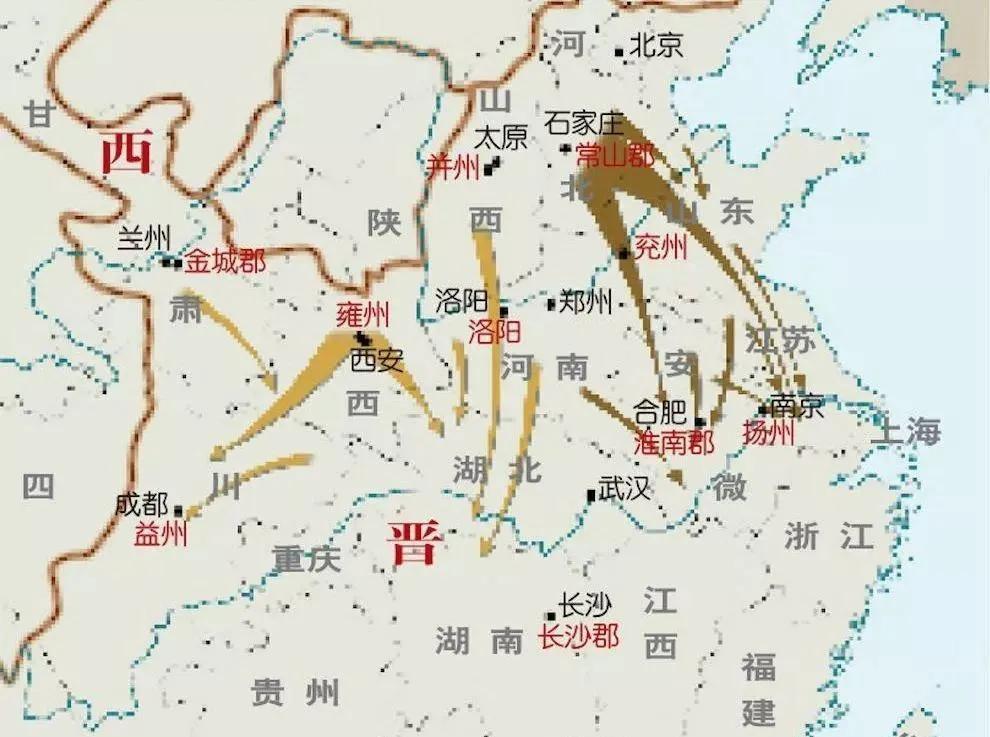The Battle of Shuishui took place in 383 AD, so why is it said that this battle is a battle related to the survival of Han culture? This was because this battle was a decisive campaign to destroy the Eastern Jin Dynasty launched by former Qin Emperor Jian Jian. It should be known that since the rebellion of the Eight Kings of the Western Jin Dynasty, the Western Jin Dynasty moved its capital to the Eastern Jin Dynasty. The Eastern Jin Dynasty was founded in 317, and the Western Jin Dynasty moved south to take away not only the imperial family, but also a large number of literati and inkers who followed the imperial family to the south.
Since the Rebellion of the Eight Kings, the ethnic minorities in the north have invaded the Central Plains under the condition that there is no time to look north in the middle of the Central Plains. In order to compete for grazing land and slaves, various ethnic minorities fought in various kinds, and the northern residents were not happy, and the royal family moved south. The idea of "loyalty to the king" in the hearts of the people was deeply rooted, and a large number of people moved south. At that time, most of the manor economy, both large landlords controlled the land and the people, but most of the land at that time was in the hands of the gentry. In order to continue to enjoy the glory and wealth of the landlord, the people who cultivated on his land also moved south to earn a living.

Yongjia South Crossing RoadMap
In the relatively stable situation of the South, culture, economy, and politics have developed by leaps and bounds.
At this time, the northern regimes were numerous, and more than a dozen countries such as Former Zhao, Later Zhao, Former Yan, Former Qin, Later Qin, Northern Wei, and Northern Qi were established successively. The Battle of Shuishui mentioned this time was the decisive battle in a series of battles launched by Former Qin against the Eastern Jin Dynasty.
Before the Battle of Shuishui, Fu Jian unified the north. Calling himself the "Great Qin Heavenly King" and not claiming the title of emperor, Fu Jian even prepared for this battle for six years.
In August 383, Fu Jian led the infantry and cavalry to claim that only 300,000 of the million actually came to Shuishui. The Eastern Jin Dynasty, with Xie Xuan as the vanguard, led 80,000 Northern Fu troops north along the Huai River to meet the main force of the Qin army.
The road map of the Former Qin army's offensive and the road map of the Eastern Jin army's counter-offensive
In September 383, Fu Jian arrived at Xiangcheng, Liangzhou's army reached Xianyang, and Zi tong Taishou led a water division of 70,000 Shun Bashu to the east. Fu Jian's army marched into the Eastern Jin Dynasty by land and water.
In November, Xie Xuan sent Liu Gaozhi to lead 5,000 elite soldiers to Luojian, and the curtain of the Battle of Shuishui was officially opened.
In December, the battle ended with a great victory for the Eastern Jin Dynasty. This campaign brought Sima Yao, the Emperor Xiaowu of the Eastern Jin Dynasty, to official power, making the xie family's position in the Eastern Jin Dynasty extremely stable.
The Battle of Shuishui made the eastern Jin dynasty more stable, and it was a disaster for Fu Jian and Former Qin. Former Qin no longer had elite soldiers and no spare strength to invade the south. The ethnic minorities in the north were unable to invade the south, which won time and opportunities for the economic and cultural development of the Jiangnan region.
The reason why the Battle of Shuishui is almost closely related to the survival of Han culture is that even if the ethnic minorities in the north reuse Han People, they are also suspicious. The Han Chinese who remain in the north are in the north and their hearts are not in the north. The Han people have long been despised and suspected, which is naturally not conducive to the spread of Han culture. The development of literature in the north during this period was extremely slow, and if the Eastern Jin Dynasty lost this battle, then the last chance for the stable development of Han culture was completely lost.
The northern minorities lived a nomadic life before the invasion of the Central Plains, and after occupying the Central Plains, their nobles converted a large amount of arable land into pastures. Agriculture in the north was so badly damaged that the Han Chinese, who depended on the land for their survival, had to flee their homeland. Living a life that does not know full of warmth, try to ask when a person does not have enough to eat, clothes are not warm, can he still have leisure to read, teach, and solve puzzles? Therefore, the Eastern Jin Dynasty cannot be defeated, the Eastern Jin Dynasty is defeated, and Han culture and Confucianism will go to extinction.
The victory of the Eastern Jin Dynasty in the Battle of Shuishui preserved the core part of Chinese culture and Han culture. And let the culture get a chance to breathe, so as not to make the Chinese culture to die.